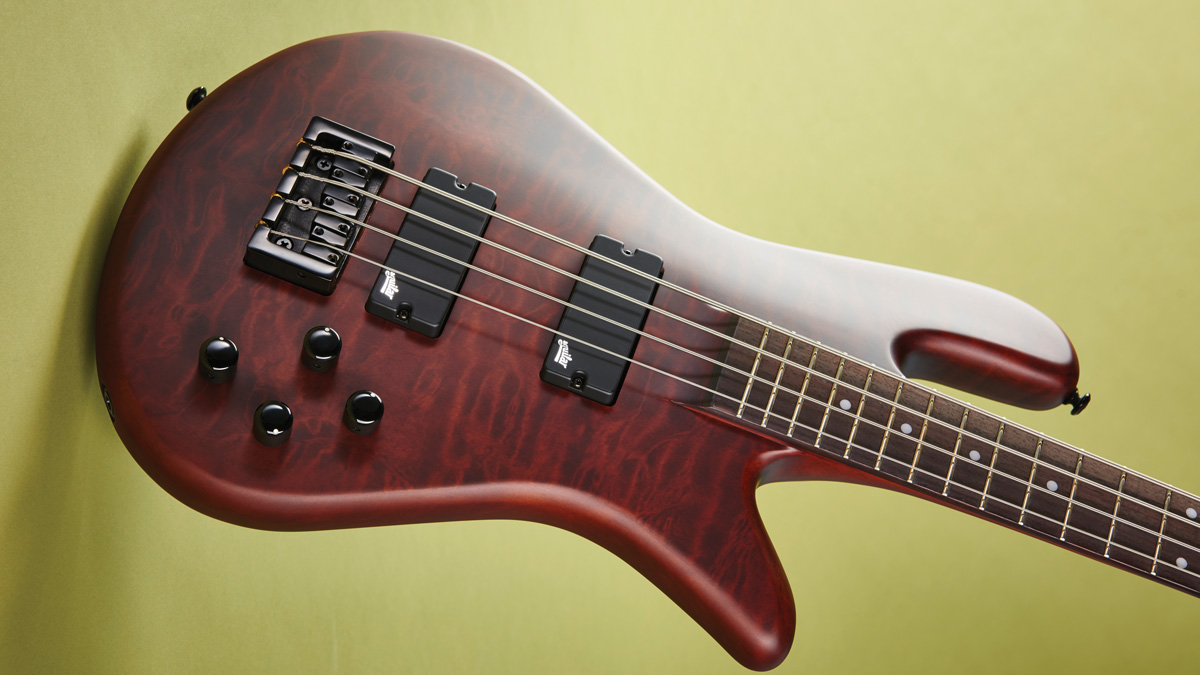MusicRadar Verdict
Spector nails it yet again.
Pros
- +
Superb tone range and playability.
Cons
- -
A touch on the pricey side.
MusicRadar's got your back
At this point in the brand’s history, Spector basses are pretty much unstoppable.
The marque doesn’t need to change its approach or style: it gained mass respect years ago. At this stage, Stuart Spector and his team are doing exactly what they need to do to keep bassists happy, simply by issuing desirable variants of the classic designs that have become embedded in our community’s DNA.
One of these is this splendiferous new Legend, a maple-bodied instrument with a walnut finish for that classy extra touch of luxury. Let’s have it.
Build Quality
Maple on maple may sound like a standard (and even boring) wood combination for a bass guitar, but the Legend’s top is a thing of bevelled beauty, make no mistake. The walnut finish doesn’t actually mean that walnut wood has been used, more’s the pity: we’ve always wondered what Lemmy’s walnut-bodied Rickenbacker would sound like if you smoothed it off a bit and made the pickups easier on the ear.
Welcoming to the ‘amply-nourished’ player thanks to its abdomen-friendly rear body shape, this bass is a joy to wear. Like a hand-tooled cigar case or Jaguar E-Type leather gearstick surround, the instrument looks and feels as if it’s had a lot of money spent on it, from the brass nut to the heavy-duty bridge. Mind you, so it darn well should for 1200 quid and change, which (lest we forget) equates to two perfectly good used Fenders, Warwicks, or more or less any other heritage bass brand.
Sounds & Playability
Neck-through basses suit our needs down to the ground, with that ‘full’, resonant feel that is so hard to describe on paper all present and correct. We love the twang and bounce of bolt-ons too, but there’s something about the woods here that feels more natural and organic when they’re shaped into a single centrepiece and wings.
Helped along by its tank-like bridge, the Legend takes the notes you play - pick style provides the biggest response, but fingers reward you too - and turns them into extended, smooth rumbles.
Want all the hottest music and gear news, reviews, deals, features and more, direct to your inbox? Sign up here.
The two-octave neck may be overkill, given the sheer presence of this slab of wood, but there are no balance issues, so what the hey. Four non-detented (grrr) controls shape your tone.
As passive pickups, the Aguilar humbuckers sound clean but subtle: bassists looking for units that supercharge your tone need to look elsewhere (or just turn up the volume). Volumes and boost/cut controls for each pickup give you a reasonable number of tone options, but the Legend’s secret weapon is the active tone control, an Aguilar OPB-2 pot that lends some added beef and fizz to the top and bottom ends should you need it. Use it with caution: it’s powerful.
This is a wonderful, muscular bass, available for purchase for an appropriately accountant-unnerving price
This control comes most obviously to the fore when you slap and pop. You can achieve a classic, if slightly polite, slap tone without resorting to the active control: indeed, maxing out both pickups and rolling on the top end gives you serious attack.
Add in the OPB-2, though, and you’re in mids heaven, bolstered by a zippy top end. Throaty, unforgiving, even slightly obnoxious... all your favourite bass adjectives apply, and then some.
This is a wonderful, muscular bass, available for purchase for an appropriately accountant-unnerving price. This instrument oozes a traditional feel which may or may not suit you, depending on your predilection for solid, massive-feeling basses.
Then there’s the neck-thru option and the interesting passive-pickups-plus-active-tone combination, neither or both of which may suit your needs.
Personally we’re into the tones and feel all the way, and we could play the walnut Legend all day, which is in fact exactly what we’ve done. Why not try it out yourself?
